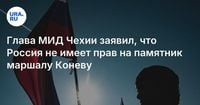Maria Zakharova, the official representative of the Russian Foreign Ministry, has sharply criticized the Czech Foreign Minister Jan Lipavsky for his recent statements regarding the monument to Marshal Ivan Konev. Lipavsky asserted that Russia has no rights to the monument, which was removed from its pedestal in Prague in April 2020, a move that Zakharova labeled as "a perfect example of subservience to meanness."
The controversy began when Russian Ambassador to Prague, Alexander Zmeevsky, reached out to the Czech Foreign Ministry seeking assistance in locating the missing monument. Lipavsky responded by stating that the statue was installed by Czech Bolsheviks in 1980 as a gesture of subservience to the Soviet Union, and thus, he claimed, Russia has no claim over it.
Zakharova did not hold back in her response, emphasizing that Lipavsky's comments represented a betrayal of his own citizens and a disregard for historical memory. "The head of the Czech Foreign Ministry has betrayed everyone, including his own citizens," she stated, underscoring the emotional weight of the issue.
The monument to Marshal Konev was erected in Prague on May 9, 1980, to commemorate his role in the liberation of Czechoslovakia from Nazi occupation during World War II. Konev commanded the 1st Ukrainian Front, which played a crucial role in the offensive that led to the liberation of Prague in May 1945. However, the statue's significance has been overshadowed by political disputes in recent years.
In early April 2020, the Prague city authorities decided to dismantle the monument, a decision that was met with public protests and opposition from then-President Milos Zeman. The city administration justified the removal by citing Konev's involvement in suppressing the Hungarian uprising in 1956 and his role in the Warsaw Pact invasion of Czechoslovakia in 1968, events that are viewed negatively in Czech history.
After the monument's removal, it was taken to a depository, but its exact location remains unknown. The Russian Embassy in Prague has expressed concerns about the condition of the statue since its removal and has requested access to inspect it.
Zakharova's remarks echo a broader sentiment among Russian officials who view the dismantling of the Konev monument as an affront to Russia's historical contributions to the liberation of Europe. The Investigative Committee of Russia even initiated a criminal case regarding the desecration of symbols of military glory following the monument's removal.
This incident is not isolated; it reflects ongoing tensions between Russia and the Czech Republic regarding historical narratives and the legacy of World War II. In recent years, several monuments dedicated to Soviet soldiers and figures have faced similar fates, as Czech authorities grapple with their complex history.
In her comments, Zakharova also pointed out that the Czech authorities have previously acted dismissively towards monuments honoring liberators, referencing a decision in Litomerice to relocate another Soviet-era memorial out of public view.
As the debate continues, the fate of the Konev monument remains a symbol of the larger struggle over historical memory and national identity in Central Europe. For many in Russia, Konev's legacy is one of heroism and sacrifice, while in the Czech Republic, it has become a contentious issue intertwined with modern political dynamics.
While the Czech government maintains that the decision to remove the monument was made democratically and reflects a contemporary understanding of history, Russian officials argue that such actions erase the contributions of those who fought against fascism. This clash of perspectives highlights the ongoing challenges in reconciling historical narratives in post-Soviet states.
As the Russian Embassy continues to seek clarity on the monument's whereabouts, the situation serves as a reminder of the fragile nature of historical memory and the ways in which it can be manipulated for political ends. The Konev monument, once a symbol of gratitude and remembrance, has become a flashpoint in the ongoing dialogue about history, identity, and the legacy of World War II in Europe.
The Konev monument's removal has sparked discussions not only about the specific historical figure but also about how nations remember their pasts. As countries navigate the complexities of their histories, the actions taken today will undoubtedly shape the narratives of tomorrow.

